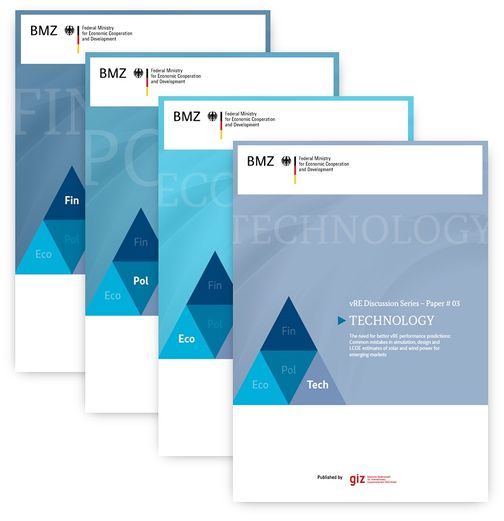VRE Discussion Series
| In October GIZ released the first five issues of the “vRE Discussion Series“.
The “vRE Discussion Series” will continuously put forth emerging results and issues of special interest to GIZ partners, along the 4 main fields of our work: vRE policy, economics, finance and technology issues. As the series’ title indicates, these are often based on work in progress, and we strongly encourage suggestions and ideas by mail to the contact below. Klas Heising - Head of Sector Program "Technology Cooperation in the Energy Sector": klas.heising@giz.de Frank Seidel - Sector Program "Technology Cooperation in the Energy Sector": frank.seidel@giz.de |
The GIZ TechCoop vRE Programme
Over the past decade, a “1st wave” of National Subsidy Programmes for variable/ fluctuating Renewable Energies (vRE) has (i) led to impressive growth in global cumulative installed capacity of wind and PV power and (ii) dramatic RE cost reductions. However, due to their typical “technology push” focus, most of these1st wave national vRE programmes have not aimed at achieving an economically optimal pathway for national wind and PV development over time. Naturally, this has led to suboptimal national RE deployment, resulting in (i) unnecessary losses of Government budget and credibility (subsidy schemes were too expensive or too slow, RE technologies were scaled up too early or applied at the wrong network nodes, lack of planning resulted in avoidable transmission losses or dispatch problems), and/or (ii) excessive private sector profits and/or massive insolvency waves after subsidy-driven vRE bubbles. None of this is intrinsic to vRE technologies or economics: it was simply ill-advised planning.
Increasingly, OECD and non-OECD Governments want to move beyond simple vRE technology-push policies, and shift to a new, 2nd wave of optimized national vRE pathways, by applying the same fundamental economic, financial and political goal functions that are used successfully for standard power system planning. To this end, vRE need to be analyzed as an INTEGRAL part of the national energy system and its growth in time and space, by applying methods which readily fit the toolkit already used by dispatchers, regulators and utilities.
Integrated vRE National Masterplans do not exist yet, though it is pretty clear what they would have to accomplish (IEA 2014, SMUD 2013). This has several causes, such as: (i) the inherent fluctuating character of vRE (wind and PV feed-in depends strongly on sunshine and wind availability at any given moment) poses a set of specific power planning and dispatch problems to established sector agents (dispatch, regulator, utilities) which may seem daunting initially (yet, a closer look reveals that they can be handled easily by these players with their existing processes, with a modest amount of training); (ii) existing studies have often focused on OECD countries and their results are not readily transferrable to GIZ partner countries (where grids can be weaker and demand grows faster and hydro can play a more positive role in vRE development); and (iii) few studies focus on pragmatic incremental steps based on the real-life generation mix, transmission system and fixed short-term capacity planning of specific countries (most look at long term vRE targets including smart storage >2030 instead, thus providing little guidance to pragmatic policy makers).
[1]Published Discussion Papers
Last date of release: October 7th, 2014
| Paper 1 – Policy: Towards Adequate National Renewable Energy Planning for dynamic energy sectors.Authors: K. Heising, K. Reiche and B. ZymlaThis paper is available in multiple languages:
English View Arabic French Spanish Turkish View | |
| Paper 2 – Economics: Estimating the Operational Benefits and Wind Shares in National Power Grids.Authors: W. Teplitz, K. Reiche, E. DurandView | |
| Paper 3 – Technology: The Need for better vRE Performance Predictions: Common Mistakes in Simulation, Design and LCOE Estimates of Solar and Wind Power for Emerging Markets.Authors: H.-G. Beyer, G. Hille, K. Reiche, R. RütherView | |
| Paper 4 – Finance: PV Finance and Project Development; How local Market Conditions are affecting Cost, Risk and Return.Authors: G. Hille, K. Heising, K. ReicheView | |
| Paper 5 – Technology: Power System Security in Developing and Emerging Countries.Authors: Markus Pöller, Moeller & Poeller Engineering (M.P.E.) GmbHView |




















